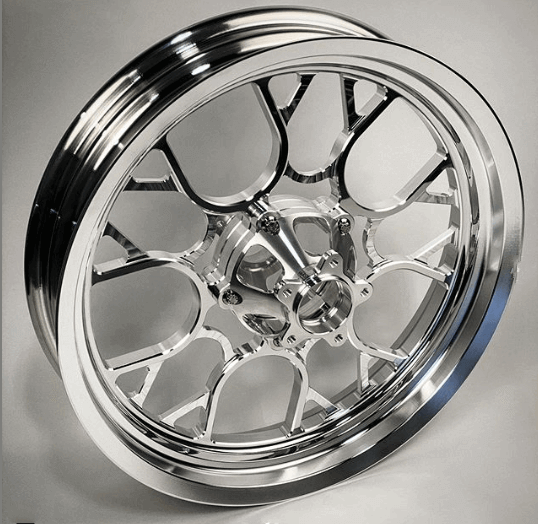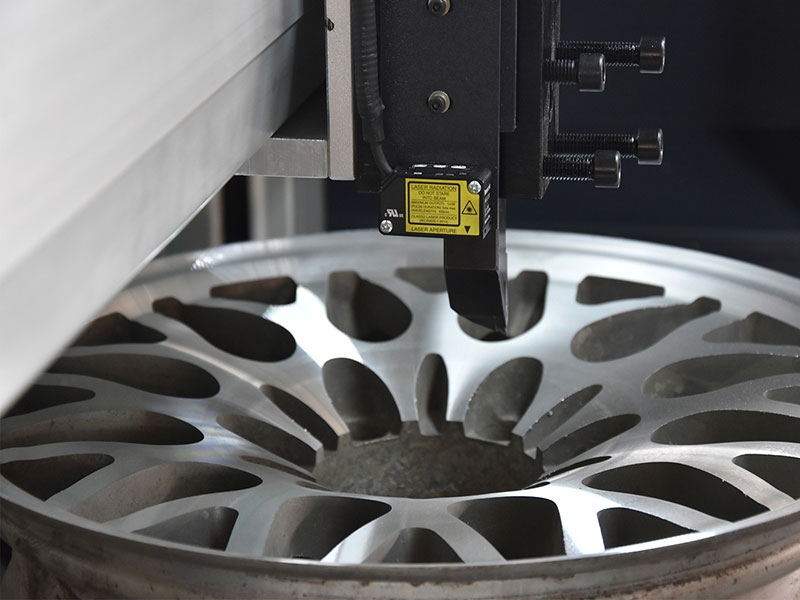CNC wheels bring clear benefits in design, precision, and efficiency. They offer strong, durable parts made with less waste and lower costs. Their ability to deliver exact shapes boosts safety and performance in many industries. Plus, CNC wheels adapt easily to custom needs and work well with modern vehicle systems. With proper care, they last longer and keep their quality. Choosing the right CNC wheel means weighing factors like material, use, and maintenance. Overall, CNC wheels stand out from traditional options by combining innovation with reliability. This makes them a smart choice for those who value precision, cost savings, and strong performance.
Precision and Quality Enhancement Through CNC Wheel Technology

High-Precision Manufacturing
CNC technology plays a key role in reaching exact machining tolerances needed for wheel components. Using linear guide rails and servo motors boosts machine rigidity and enables real-time monitoring to maintain precision. This setup controls the tool’s position tightly, minimizing any vibration or backlash during cutting. With 5-axis CNC machining, wheels can be made with complex shapes, angles, and curves that traditional methods cannot handle. This allows producing intricate wheel designs with superior accuracy. The result is consistent dimensional accuracy and smooth surface finishes that reduce installation fitment issues and vibrations while driving. Such precision decreases the likelihood of wheel imbalance, which otherwise leads to uneven tire wear.
Quality Control and Consistency
Automation and integrated software ensure that CNC wheels have consistent quality across every production run. Unlike manual methods prone to human error, CNC machines execute exact program instructions repeatedly, cutting down defects. This uniformity leads to better overall product reliability and safety. Predictable material behavior from exact machining means wheels balance well, which raises safety standards by reducing risks of vibration-induced control loss. Manufacturers can monitor production data in real time, quickly detecting deviations to keep quality tight and within specifications. This quality control improves wheel durability and driver confidence over the wheel’s lifespan.
Improved Wheel Performance from Precision
Precision machining directly enhances vehicle performance. CNC wheels weigh less by reducing unsprung mass, which improves ride comfort, acceleration, braking, and handling stability. The tailored spoke geometry enabled by CNC cutting facilitates better brake cooling, allowing brakes to maintain consistent performance under stress. Precise fitment reduces vibrations, boosting driving smoothness and extending tire life. Additionally, the high-quality materials used and tight manufacturing control make CNC wheels more durable than many cast alternatives, supporting safer and more stable vehicle dynamics. The improved balance and reduced mechanical losses positively affect fuel efficiency and overall vehicle responsiveness. For deeper insights, explore the benefits associated with CNC wheel lathe machines.
| Benefit | Effect on Vehicle Performance |
|---|---|
| Reduced Unsprung Mass | Improved acceleration, braking, ride comfort |
| Tailored Spoke Geometry | Enhanced brake cooling and consistent braking |
| Precise Fitment | Reduced vibrations, improved smoothness |
| High-Quality Materials | Increased durability and safety |
Customization and Design Flexibility With CNC Wheels
Flexible and Intricate Design Capabilities
CNC technology, especially with 5-axis machines, allows me to create wheels with intricate curves, sharp angles, and complex patterns. These details would be tough to achieve through traditional machining. I can customize offsets and design multi-piece wheel assemblies, providing unique aesthetics that stand out. For automotive enthusiasts, this means crafting truly personalized wheels that reflect individual style while maintaining high structural quality. Many have used CNC wheels to achieve designs that blend art with performance, combining both looks and function seamlessly.
Rapid Prototyping and Design Modifications
One key benefit I notice is the ease of programming CNC machines, which allows quick design iterations without adding costly downtime. Unlike traditional casting or forging, CNC enables faster turnaround for custom wheel batches. By integrating advanced CAD/CAM software, I can experiment with innovative patterns and finish styles efficiently. This rapid prototyping capability accelerates product development and ensures each wheel meets exact design and functional requirements before full-scale production. For examples of customization options, check out CNC wheel design capabilities.
Application Versatility
CNC wheels find applications beyond automotive uses. They are tailored for aerospace parts, specialized wheels for heavy machinery, and niche markets like racing or off-roading. The adaptability of CNC machining lets me work with various materials, primarily aluminum alloys, which balance strength and weight for durability and performance. Specialty wheels crafted via CNC serve luxury vehicles, competitive race cars, and rugged off-road machines, showcasing the technology’s broad scope and capacity to meet diverse industry needs.
| Application Sector | Material Used | Benefit |
|---|---|---|
| Automotive | Aluminum Alloys | Lightweight, durable |
| Aerospace | High-Strength Metals | Precision and strength |
| Heavy Machinery | Specialized Alloys | Durability under stress |
| Racing & Off-Roading | Lightweight Alloys | Performance and resilience |
Efficiency, Cost-Effectiveness, and Sustainability Benefits

Enhanced Manufacturing Efficiency
CNC wheel manufacturing drastically reduces production time by using advanced 5-axis CNC machines that operate along multiple axes simultaneously. This capability allows for complex wheel shapes to be cut in fewer steps without stopping the machine, cutting down setup and handling time. Automation minimizes the need for manual labor, which lowers manufacturing overheads and reduces human error. Precise CNC cutting also means less material waste compared to traditional wheel production methods like casting or forging. This precision not only saves raw materials but also ensures each wheel meets exact specifications, minimizing the need for rework or scrap.
Cost Advantages
One of the key benefits of CNC wheels is cost-effectiveness over time. The precision cutting reduces scrap rates and limits defective units, which lowers overall material costs and minimizes rework expenses. Although CNC wheels feature advanced customization and precision, their upfront manufacturing costs remain competitive with other high-performance wheel types, such as forged wheels. CNC machining offers scalable economic benefits too; it is efficient for both small production runs and large-scale manufacturing, allowing companies to meet varying market demands without significant cost increases. These factors contribute to long-term financial savings across the wheel’s production lifecycle.
Environmental Impact and Sustainability
Sustainability is a growing priority in CNC wheel manufacturing. By using CNC technology, the production process consumes less raw material due to precise cutting methods and enables efficient recycling of scrap metal. CNC machinery used today emphasizes energy efficiency by optimizing power use during operation, leading to less energy consumed per wheel produced. This improvement lowers the environmental footprint compared to traditional wheel manufacturing. Furthermore, the industry is actively developing eco-friendly CNC wheel solutions that integrate innovations for reducing waste and energy, highlighting the environmental benefits of CNC technology in automotive and aerospace applications alike.
| Aspect | CNC Wheels | Traditional Wheels |
|---|---|---|
| Material Waste | Minimal, precise cutting | Higher due to casting losses |
| Energy Consumption | Optimized, energy-efficient | More energy-intensive |
| Production Time | Reduced with automation | Longer, manual steps |
| Cost Over Time | Lower due to fewer defects | Higher due to scrap/rework |
| Environmental Impact | Lower carbon footprint | Higher waste and energy use |
Durability, Strength, and Safety Improvements with CNC Wheels

Superior Material Strength and Longevity
CNC wheels are machined from solid blocks of high-quality aluminum alloys, which gives them superior material integrity compared to cast wheels. This process removes many structural defects common in casting, such as porosity, that can lead to early failure. The use of premium aluminum alloys ensures that CNC wheels resist wear and corrosion, extending their lifespan significantly. Precise CNC machining minimizes weak points, giving these wheels enhanced strength and durability. This contributes to improved machine longevity in automotive and fabrication settings, where wheels must withstand continuous stress.
Improved Safety and Reliability
The exact fitment of CNC machine wheels reduces vibrations and prevents wheel imbalance, which lowers the risk of uneven tire wear and enhances ride quality. The design flexibility allows for optimized spoke geometry that improves brake cooling, supporting safer driving by maintaining consistent braking performance. All CNC wheels undergo strict quality control tests to meet high-stress standards, ensuring reliability in harsh environments. This makes them ideal for automotive CNC solutions, providing vehicle owners with enhanced safety and dependable performance under varied driving conditions.
Comparison with Alternative Wheel Types
When compared to cast and forged wheels, CNC wheels offer a unique balance of strength, durability, and customization. Cast wheels may suffer from structural weaknesses, while forged wheels, though very strong, come with higher costs and less design flexibility. CNC wheels are suitable for daily driving and moderate performance use, delivering reliable performance and good longevity. However, they have limitations in extreme heavy-duty or high-stress racing applications, where forged options might be preferred. Understanding these nuances helps users choose the right wheel type for their specific needs.
Choosing and Maintaining CNC Wheels: Practical Considerations
Factors to Consider When Selecting CNC Wheels
Choosing the right CNC wheels involves matching wheel specs to your vehicle type, driving conditions, and performance goals. For example, lightweight CNC machine wheels are ideal for performance cars seeking enhanced acceleration and handling due to their reduced unsprung weight. It’s essential to select CNC wheels made with certified materials—often high-grade aluminum alloys—and ensure machining quality meets strict standards. Precision CNC tools cut these wheels from solid blocks, guaranteeing consistent strength and durability. Consider wheel size carefully, as larger diameters affect ride quality and clearance. Design complexity and customization capabilities also matter; 5-axis CNC machining lets manufacturers create intricate designs and multi-piece setups tailored to specific uses, from daily driving to racing or luxury applications.
Maintenance and Longevity Tips
Routine inspections are crucial for maintaining CNC-machined wheels. Check for any signs of damage like cracks or corrosion that may compromise wheel integrity. Regular cleaning using pH-neutral soap and water helps preserve the finish and structural strength; harsh chemicals can erode the wheel’s surface. CNC wheels, especially multi-piece models, offer repair advantages since damaged sections can sometimes be replaced instead of the entire wheel. Maintaining bolts, seals, and joints extends the lifespan of these complex wheels. Following manufacturer maintenance guidelines ensures your CNC wheels maintain performance and aesthetic appeal for years.
Integration in Vehicle Systems
CNC wheels boost vehicle system performance by complementing suspension and braking for maximum efficiency. Their precise dimensions reduce vibration and contribute to better ride quality and stability. Many CNC wheels are designed with spokes and forms that optimize brake cooling, helping maintain consistent braking performance under stress. They are compatible with modern automotive safety technologies such as TPMS (tire pressure monitoring systems) and ABS, supporting enhanced vehicle control. OEMs and aftermarket providers increasingly support CNC wheels, offering upgrades that enhance aesthetics and performance, making CNC technology a smart choice for automotive enhancement and customization. For more details on cost advantages of CNC wheels, visit Cost Benefits of CNC Machining.
FAQs about CNC wheel benefits:
What are the main benefits of CNC wheels?
The main benefits of CNC wheels include precise manufacturing, which ensures enhanced performance and safety. CNC wheels offer consistent quality with tight tolerances, resulting in better fitment and balanced weight. This precision helps improve vehicle handling and fuel efficiency. Additionally, CNC wheels provide design flexibility, allowing for customized aesthetics that suit individual preferences.
How do CNC wheels improve vehicle performance?
CNC wheels improve vehicle performance by being machined to exact specifications, which contributes to optimal balance and reduced vibrations. This precision machining reduces wheel weight compared to conventional wheels, enhancing acceleration and braking efficiency. The improved balance also extends tire life and promotes smoother rides, making CNC wheels a valuable upgrade for performance enthusiasts.
Are CNC wheels more durable than standard wheels?
CNC wheels are generally more durable than standard wheels because they are crafted from high-quality materials with precision machining that eliminates structural weaknesses. The manufacturing process reduces inconsistencies and defects, leading to increased strength and resistance to deformation. This durability translates to longer wheel lifespan and better handling under demanding driving conditions.
Can CNC wheels be customized to match specific designs?
CNC wheels can be customized extensively to match specific designs, thanks to the computer-controlled machining process. This allows manufacturers to create intricate patterns, unique finishes, and personalized sizes tailored to customer preferences. Custom CNC wheels offer not just improved performance but also a distinctive aesthetic appeal, making them popular among automotive enthusiasts seeking individuality.
